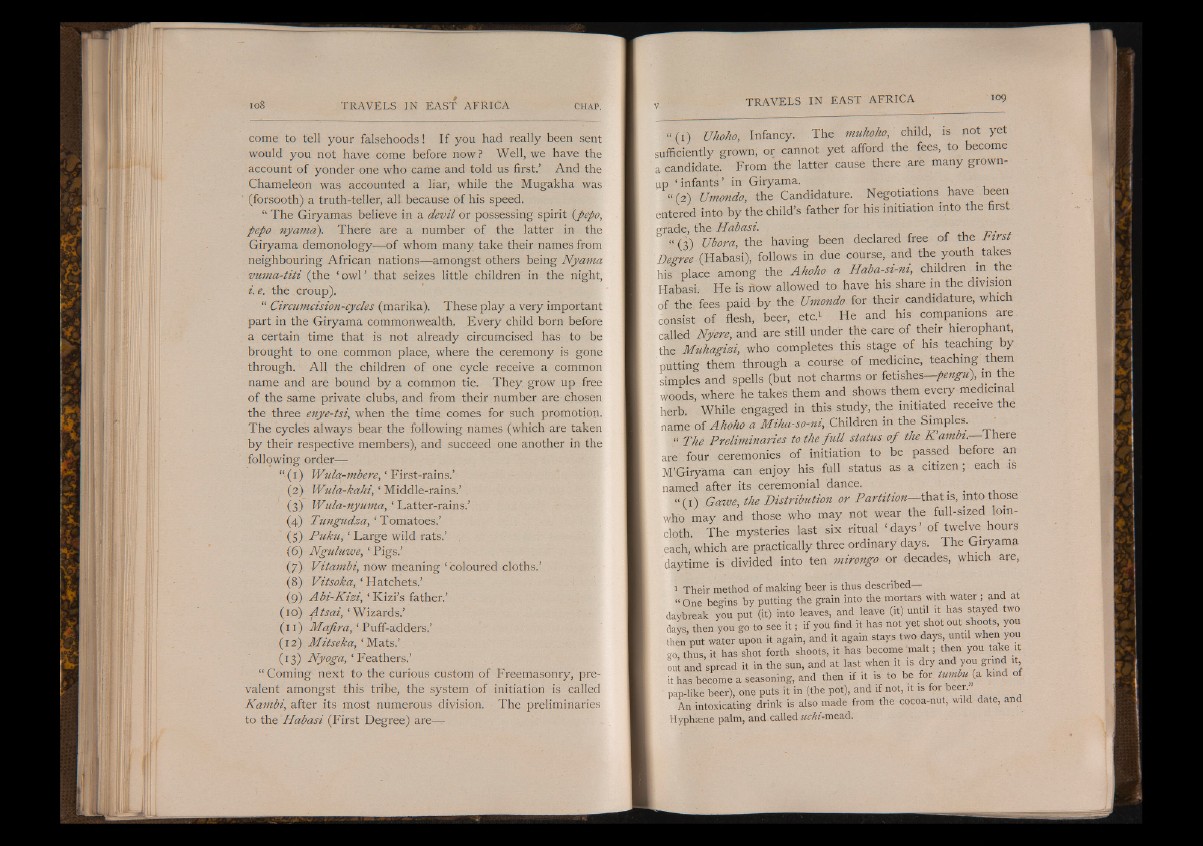
come to tell your falsehoods! If you had really been sent
would you not have come before now ? Well, we have the
account of yonder one who came and told us first.’ And the
Chameleon was accounted a liar, while the Mugakha was
(forsooth) a truth-teller, all because of his speed.
“ The Giryamas believe in a devil or possessing spirit (pepo,
pepo nyama). There are a number of the latter in the
Giryama demonology— of whom many take their names from
neighbouring African nations— amongst others being Nyama
vuma-titi (the ‘ owl ’ that seizes little children in the night,
i.e. the croup).
“ Circumcision-cycles (marika). These play a very important
part in the Giryama commonwealth. Every child born before
a certain time that is not already circumcised has to he
brought to one common place, where the ceremony is gone
through. All the children of one cycle receive a common
name and are bound by a common tie. They, grow up free
of the same private clubs, and from their number are chosen
the three enye-tsi, when the time comes for such promotion.
The cycles always bear the following names (which are taken
by their respective members), and succeed one another in the
following order—
“ (i) Wula-mbere, ‘ First-rains.’
(2) Wula-kahi, ‘ Middle-rains.’
(3) Wula-nyuma,' Latter-rains.’
(4) Tungudza,' Tomatoes.’
(5) Puku, ‘ Large wild rats.’ ,
(6) Nguluwe, ‘ Pigs.’
(7) Vitambi, now meaning ‘ coloured cloths.’
(8) Vitsoka, ‘ Hatchets.’
(9) Abi-Kizi, ‘ Kizi’s father.’
(10) Atsai, ‘Wizards.’
(11) Mafira, ‘ Puff-adders.’
(12) Mitseka, ‘ Mats.’ .
(13) Nyoga, ‘ Feathers.’
“ Coming next to the curious custom of Freemasonry, prevalent
amongst this tribe, the system of initiation is called
Kambi, after its most numerous division. The preliminaries
to the Habasi (First Degree) are—
“ (1) Uhoho, Infancy. The muhoho, child, is not yet
sufficiently grown, or cannot yet afford the fees, to become
a candidate. From the latter cause there are many grownup
‘ infants ’ in Giryama. ; _
“ (2) Umondo, the Candidature. Negotiations have been
entered into by the child’s father for his initiation into the first
grade, the Habasi.
“ (3) Ubora, the having been declared free of the First
Degree (Habasi), follows in due course, and the y o u t h takes
his place among the Ahoho a Haba-si-ni, children in the
Habasi. He is how allowed to have his share in the division
of the fees paid by the Umondo for their candidature, which
consist of flesh, beer, etc.* He and his companions are
called Nyere, and are still under the care of their hierophant,
the Muhagizi, who completes this stage of his teaching by
putting them through a course of medicine, teaching them
simples and spells (but not charms or fetishes— fiengu), m the
woods, where he takes them and shows them every medicinal
herb. ' While engaged in this study, the initiated receive the
name of Ahoho a Miha-so-ni, Children in the Simples. •
“ The Preliminaries to the fu ll status o f the K ambi. There
are four ceremonies of initiation to be passed before an
M’Giryama can enjoy his full status as a citizen ; each is
named after its ceremonial dance.
“ (1) Gawe, the Distribution or Partition— that is, into those
who may and those who may not wear the full-sized loincloth.
The mysteries last six ritual ‘ days’ of twelve hours
each, which are practically three ordinary days. The Giryama
daytime is divided into ten mirongo or decades, which are,
1 Their method of making beer is thus described
“ One begins by putting the grain into the mortars with water ; and at
daybreak you put (it) into leaves, and leave (it) until it has stayed two
days, then you go to see it ; if you find it has not yet shot out shoots, you
then put water upon it again, and it again stays two days until when you
go, thus, it has shot forth shoots, it has become‘malt ; then you take it
out and spread it in the sun, and at last when it is dry and you grind it
it has become a seasoning, and then if it is to be for tumbu j a kind of
pap-like beer),, one puts it in (the pot), and if not, it is for beer
A n intoxicating drink is also made from the cocoa-nut, wild date, and
Hyphæne palm, and called uchi-mead.